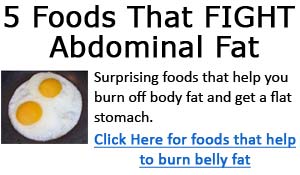- Create a slight calorie deficit through your diet
- Increase meal frequency (4 to 6 meals)
- Reduce meal portions
- Eat wholesome foods, and avoid processed foods
- Take the time to prepare your own meals instead of eating pre-cooked and pre-packaged foods
- Eat foods that "burn fat"
- Reduce your consumption of fatty foods
- Choose to eat lean white meat over red meat
- Eat more vegetables and fruits
- Drink more water
Most of these points are pretty simple and straight forward, and don't need to be explained in detail. But I would like to expand a bit on the last point - drinking more water. You may wonder what does water have to do with losing fat? Your kidneys requires water, and lots of water to function properly - most people do not drink enough water. When your kidney does not get enough water, it does not operate at optimal levels, and your liver ends up assisting the kidneys - so the liver has do perform its own functions, along with helping the water deprived kidneys. This is significant because a key function of your liver is to metabolize fat. When it has to pick up the slack from the kidneys, the liver is unable to metabolize fat efficiently.
In fact, drinking enough water plays a very important role in weight loss, and there are studies that have confirmed this and found that water consumption reduces meal energy intake, and increases weight loss. In a study involving 48 adults with BMI range between 25 to 40, the effect of reduced meal energy intake by increasing water consumption was studied. The participants were separated in to two groups - a hypocaloric diet plus 500 ml water before each meal, and a hypocaloric diet group without water before each meal. The results of this study found that weight loss was 2kg greater in the water group compared to the non-water group, and the water group had a 44% greater decline in weight over 12 weeks compared to the non-water group. They concluded that by increasing consumption of water (500ml prior to each meal), greater weight loss can be achieved. [1]
So if you're not drinking plenty of water - at least 8 glasses a day - then you need to start now. Not only does drinking extra water help you lose weight, it's also good for you, and helps improve your bodily functions. After all, 60% of your body is made up of water (55% for females). [2] As you can see, simply drinking an extra 500ml of water before each meal increased their weight loss by 2kg. If you're not getting enough water, start drinking more now.
>> Click here to learn more about the Fat Loss for Idiots Diet
Reduce Belly Fat Diet
For a diet to help you reduce belly fat and lose weight, it needs to create a calorie deficit where the amount of calories you consume is less than the amount of calories you burn. Below is a general rule of thumb on estimating how much calories you will need each day for weight loss, weight maintenance, and weight gain:
For weight loss:
Your body weight X 10 to 12 = The range of your daily caloric intake
For maintaining:
Your body weight X 13 to 15 = The range of your daily caloric intake
For bulking up:
Your body weight X 16 to 18 = The range of your daily caloric intake
For example, for a 150lb person, the weight loss caloric intake range would be about 1500 to 1800 calories per day. A more precise way to determine how much calories you burn on a daily basis is to use a BMR / RMR calculator.
 There is no shortage of diets that are created to help you lose weight and burn fat; however, as many will eventually discover, it gets more and more difficult to lose weight as your weight loss progress. The key reason why many diets fail, or begin to fail after some initial progress is because of your body's natural tendency to maintain homeostasis. "Human homeostasis refers to the body's ability to regulate physiologically its inner environment to ensure its stability in response to fluctuations in the outside environment". [1] As you reduce your calorie intake, and begin to lose weight, to maintain homeostasis, your body naturally adjusts its metabolism downwards to match your new level of calorie consumption, making it more difficult to lose weight.
There is no shortage of diets that are created to help you lose weight and burn fat; however, as many will eventually discover, it gets more and more difficult to lose weight as your weight loss progress. The key reason why many diets fail, or begin to fail after some initial progress is because of your body's natural tendency to maintain homeostasis. "Human homeostasis refers to the body's ability to regulate physiologically its inner environment to ensure its stability in response to fluctuations in the outside environment". [1] As you reduce your calorie intake, and begin to lose weight, to maintain homeostasis, your body naturally adjusts its metabolism downwards to match your new level of calorie consumption, making it more difficult to lose weight.
So what can you do to combat this slow down in weight loss and keep up with the weight loss? There are several factors to consider:
- Increase your lean muscle mass by strength training - because muscles are very metabolically active, the more lean muscle mass you have, the higher metabolism you will have, and the easier it is for you to burn fat naturally
- Engage in high intensity strength training - research has shown that by performing intense exercises, your metabolism is increased for hours even after you've completed your workout, and lipid oxidation is increased for prolonged periods after the workout. [3]
- The same principle applies to cardio training - by performing high intensity cardio sessions, you can also effectively increase your metabolism for long periods after you've completed your workout
- Follow a calorie shifting diet to lose belly fat
Calorie Shifting Diet to Lose Belly Fat
The calorie shifting diet plan is about cycling your daily calorie intake to confuse your metabolism and keep it working at a higher level. With traditional diets, a calorie deficit is created, and this calorie deficit is kept roughly the same day after day; however, our bodies are very adaptive and when it notices that it is getting less calories, it quickly adjusts metabolism downwards to conserve energy and match your energy output with the new calorie intake. This is why it become difficult to continue your weight loss after some initial success, and this is one of the main reasons why so many people fail at diets.
The major difference between calorie shifting and other diets is that calorie shifting is really just a theory - an idea - and no really a diet itself. The calorie shifting theory can be applied to any number of different diets with the key principle being a constant change in daily calorie intake. In essence, you will have days where you consume more calories than your maintenance level, and days where you have a calorie deficit.
For example, for a 150lb person, if the maintenance calories per day is 2100, then on a weekly basis, the total intake is 14,700 calories. If your goal is to lose one pound per week, you would set a goal to have a calorie deficit of 3,500 (a 23.8% calorie deficit) per week, meaning that you would aim to consume:
14,700 - 3,500 = 11,200 calories per week.
Divide this by seven days, and you get 1600 calories per day. So with a traditional diet, your goal would be to consume roughly 1600 calories per day. However, if you were to consume 1600 calorie per day on a consistent basis, you body will quickly pickup on this, and lower its metabolism to match the reduced calorie intake. To avoid this, the calorie shifting theory has been effectively used by many people to maintain a higher metabolism during their weight loss.
Using the calorie shifting principle, instead of spreading this 11,200 calories evenly over the seven days, you can have high calorie days mixed in with low calories days while still aiming to consume 11,200 calories over the entire week, which still creates a calorie deficit to help with weight loss. Below is an example:
- Monday - 1515
- Tuesday - 1925
- Wednesday - 1425
- Thursday - 1470
- Friday - 1900
- Saturday - 1465
- Sunday - 1500
- Total - 11,200
With this calorie shifting plan, you consume the same amount of 11,200 calories per week creating a deficit of 3,500 calories. The major difference here is that there are days where you consume low calories, and there are days where you consume higher amount of calories. The Fat Loss for Idiots diet is a popular diet plan based on shifting calories to increase your metabolism.
The next part will cover exercises to burn burn belly fat.
>> Click here to learn more about the Fat Loss for Idiots Diet
>> Click here for Tom Venuto's Burn the Fat Feed the Muscle program

 Aside from
Aside from 